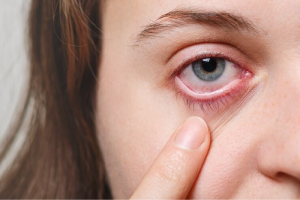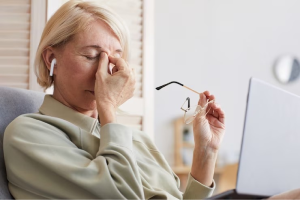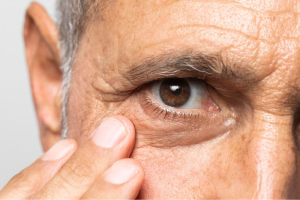Dry eyes, also known as dry eye syndrome or keratoconjunctivitis sicca, is a common condition that occurs when the eyes do not produce enough tears or when the tears evaporate too quickly. Tears are essential for maintaining the health and lubrication of the eyes. They help to keep the eyes moist, provide nourishment, and protect against infections.
Dry eyes can result from various factors, and the condition may be chronic or temporary. Some common causes and contributing factors include:
Aging:
As people get older, tear production tends to decrease.
Environmental Factors:
Exposure to windy or smoky environments, as well as air conditioning or heating systems, can contribute to dry eyes.
Blinking Abnormalities:
Incomplete or irregular blinking can lead to insufficient spreading of tears across the eye surface.
Medical Conditions:
Certain medical conditions, such as autoimmune diseases (e.g., Sjögren’s syndrome), diabetes, rheumatoid arthritis, and thyroid disorders, can affect tear production.
Medications:
Some medications, including antihistamines, decongestants, and antidepressants, can reduce tear production.
Hormonal Changes:
Hormonal changes, such as those associated with menopause in women, can affect tear production.
Eye Strain:
Prolonged use of digital devices or activities that require intense focus can lead to reduced blinking and increased evaporation of tears.



Dry eyes, also known as dry eye syndrome or keratoconjunctivitis sicca, is a condition in which your eyes don’t produce enough tears or the tears evaporate too quickly. This can lead to a range of symptoms, including:
Stinging or burning sensation:
You may experience a sensation of burning, stinging, or itching in your eyes.
Redness:
Dry eyes can cause the blood vessels on the surface of the eye to become more prominent, leading to redness.
Sensitivity to light:
Dry eyes may make your eyes more sensitive to light, causing discomfort in bright or windy environments.
Blurred vision:
Your vision may become temporarily blurred, especially during activities that require prolonged visual attention, such as reading or using a computer.
Stringy mucus in or around the eyes:
You may notice an increased production of mucus, which can be stringy and make the eyes feel sticky.
Difficulty wearing contact lenses:
People with dry eyes may find it challenging to wear contact lenses due to discomfort and irritation.
Tearing:
Paradoxically, dry eyes can sometimes cause excessive tearing. This is because the eyes respond to the dryness by producing more reflex tears, which are different from the normal tears that lubricate the eyes.
Discomfort while using digital devices:
Prolonged use of digital devices can exacerbate dry eye symptoms, as people tend to blink less frequently when staring at screens.
Feeling of a foreign body or gritty sensation:
Some people with dry eyes may feel as though there’s something in their eye, like a foreign body or grit.
Relief from Discomfort:
Treatment can alleviate the symptoms associated with dry eyes, such as itching, burning, redness, and a gritty sensation.
Improved Vision:
Addressing dry eyes can help improve vision, reduce blurriness, and enhance overall visual comfort.
Prevention of Complications:
Chronic dry eye can lead to complications such as corneal damage or infections. Treatment aims to prevent or manage these complications.
Enhanced Eye Health:
Treating dry eyes promotes overall eye health by maintaining the proper balance of tears and preventing damage to the cornea.
Increased Comfort with Contact Lenses:
For individuals who wear contact lenses, dry eyes treatment can make wearing contacts more comfortable and feasible.
Better Quality of Life:
Managing dry eyes effectively can significantly improve the quality of life for individuals by reducing the impact of symptoms on daily activities.
Customized Treatment Plans:
Eye care professionals often tailor treatment plans to the specific needs of the individual, taking into account factors such as the underlying cause of dry eyes and the severity of symptoms.
Preventing dry eyes involves taking steps to maintain a healthy tear film and minimize factors that contribute to dryness.
Here are some general tips for preventing dry eyes:
Blink Regularly:
Remember to blink regularly, especially when using digital devices for an extended period. Blinking helps distribute tears evenly and keeps the eyes moist.
Follow the 20-20-20 Rule:
When working on a computer or other digital devices, take a break every 20 minutes, look at something 20 feet away, and blink 20 times. This can help reduce eye strain.
Maintain Proper Humidity:
Use a humidifier to add moisture to the air, especially in environments with dry air, such as heated or air-conditioned spaces.
Stay Hydrated:
Drink an adequate amount of water to maintain overall hydration, which can help support tear production.
Protect Your Eyes:
Wear wraparound sunglasses to shield your eyes from wind and dust when outdoors. This can help reduce evaporation of tears.
Position Your Computer Screen:
Adjust the position of your computer screen to minimize glare and reduce the need to squint, which can contribute to dry eyes.
Use Artificial Tears:
Over-the-counter artificial tear drops or lubricating eye drops can help supplement your natural tears. Use them as directed, even if your eyes feel fine, to prevent dryness.
Take Omega-3 Fatty Acids:
Consider incorporating foods rich in omega-3 fatty acids (such as fish) into your diet or taking omega-3 supplements. These may support tear production.
Limit Screen Time:
Reduce the amount of time spent on digital devices, or take breaks to rest your eyes.
Adjust Workspace Ergonomics:
Ensure your computer screen is at eye level and that your chair and desk are positioned properly to reduce strain on your eyes.
Avoid Smoke and Irritants:
Avoid exposure to smoke, and minimize exposure to other environmental irritants such as air pollution.
Manage Allergies:
If you have allergies, manage them effectively, as allergic reactions can contribute to dry eyes.
Regular Eye Exams:
Schedule regular eye exams with an eye care professional. They can identify any underlying issues and provide guidance on maintaining eye health.
1. What are the common causes of dry eyes?
Dry eyes can result from various factors such as prolonged screen use, aging, certain medications, environmental conditions (like dry or windy climates), medical conditions (like diabetes or autoimmune diseases), and insufficient tear production.
2. What are the initial steps to manage dry eyes at home?
Simple lifestyle changes like using a humidifier, taking breaks during prolonged screen time, staying hydrated, and avoiding smoke or windy environments can help. Over-the-counter artificial tears or lubricating eye drops can also provide relief.
3. When should someone seek professional treatment for dry eyes?
If over-the-counter solutions don’t alleviate symptoms or if there’s persistent discomfort, redness, pain, or vision changes, it’s advisable to consult an eye care professional. Additionally, if dry eyes affect daily activities, professional guidance is crucial.
4. What treatment options are available for severe dry eyes?
For severe cases, prescription eye drops, medications to reduce inflammation, or procedures like punctal plugs (to block tear ducts) or intense pulsed light therapy might be recommended. In rare cases, surgical options might be considered.
5. Are there any preventive measures for recurring dry eyes?
Maintaining good eye hygiene, using protective eyewear in windy or dusty environments, practicing the 20-20-20 rule (taking breaks every 20 minutes, looking 20 feet away for 20 seconds), and regular eye check-ups can help prevent recurring dry eye symptoms.










